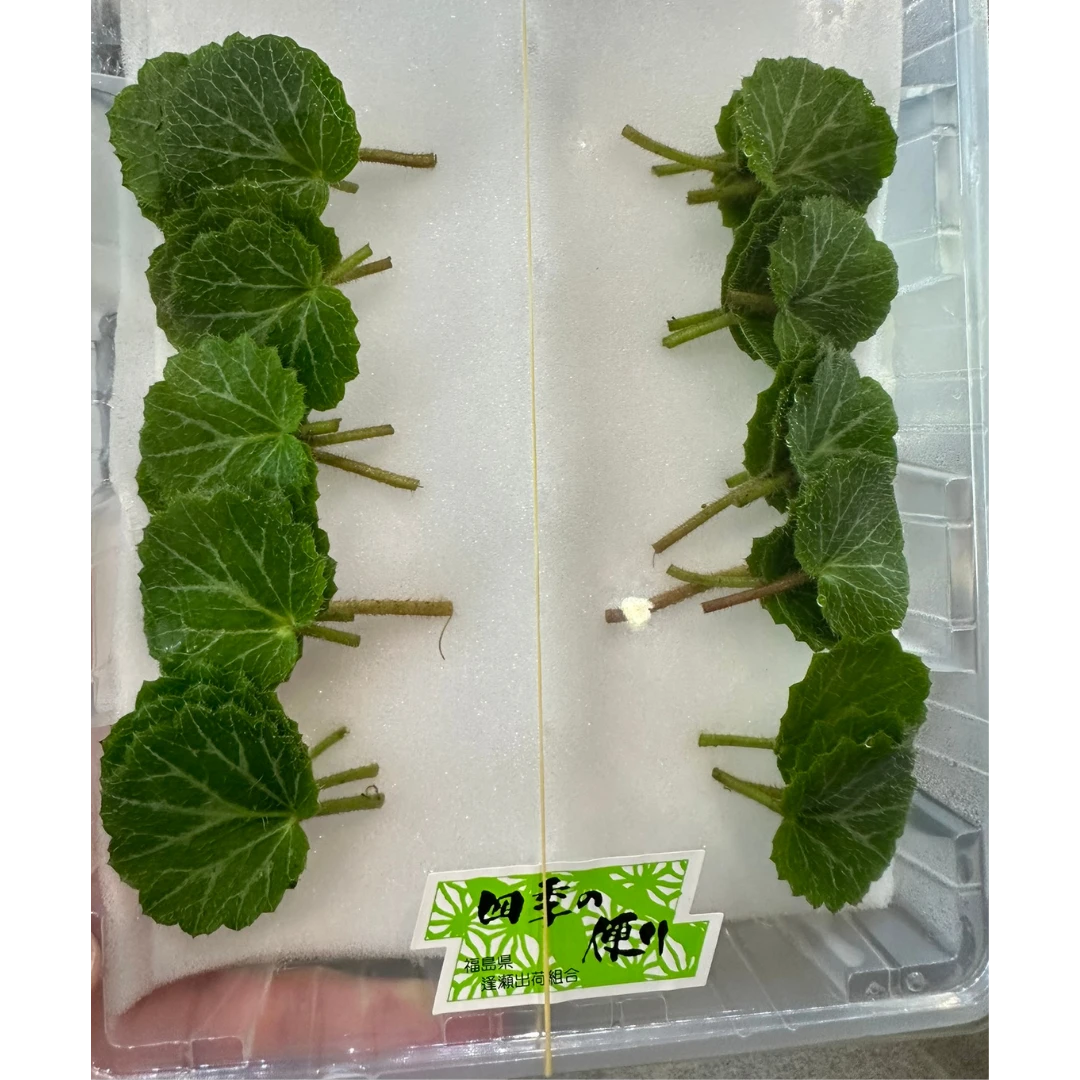YUKI NO SHITA - CREEPING SAXIFRAGE / STRAWBERRY GERANIUM - Saxifraga stolonifera

Description
雪の下 YUKI NO SHITA - CREEPING SAXIFRAGE / STRAWBERRY GERANIUM - Saxifraga stolonifera
Texture/Flavor Profile
Yuki no Shita features tender, succulent leaves with a mild, slightly sweet flavor reminiscent of fresh strawberries. Its delicate texture makes it a versatile ingredient for both garnish and cooking, adding a unique touch to salads, desserts, and savory dishes alike.
Availability/Seasonality
Yuki no Shita is typically available in the spring and early summer, thriving in cooler temperatures. This seasonal availability makes it a delightful addition to menus during these months, allowing chefs to incorporate fresh, vibrant flavors into their dishes.
About
Yuki no Shita, or Creeping Saxifrage, Saxifraga stolonifera, is a charming perennial known for its lush green foliage and unique appearance. Often found in shaded areas, this plant is celebrated for its culinary uses in traditional Japanese cuisine. Its leaves and flowers not only provide aesthetic appeal but also offer a subtle sweetness that enhances a variety of dishes.
Preparation
When preparing Yuki no Shita, gently rinse the leaves and flowers to remove any dirt. Use fresh leaves in salads for a refreshing crunch or incorporate them into sushi for added flavor. The flowers can be used as a colorful garnish on desserts or in cocktails, showcasing their beauty and uniqueness.
Nutritional Value
Yuki no Shita is low in calories and provides essential vitamins and minerals. Its leafy greens are rich in antioxidants, making it a healthy addition to dishes while contributing to a balanced diet.
Selection and Storage
Select vibrant, green leaves and fresh flowers for the best quality. Store Yuki no Shita in a cool, dry place or refrigerate in a damp paper towel to maintain freshness. Use within a week to enjoy its optimal flavor and texture.
Summary
Yuki no Shita is a versatile and visually appealing ingredient that enhances dishes with its delicate flavor and unique presentation. Ideal for chefs looking to elevate their culinary creations, this creeping saxifrage brings a touch of springtime freshness to any menu.
Texture/Flavor Profile
Yuki no Shita features tender, succulent leaves with a mild, slightly sweet flavor reminiscent of fresh strawberries. Its delicate texture makes it a versatile ingredient for both garnish and cooking, adding a unique touch to salads, desserts, and savory dishes alike.
Availability/Seasonality
Yuki no Shita is typically available in the spring and early summer, thriving in cooler temperatures. This seasonal availability makes it a delightful addition to menus during these months, allowing chefs to incorporate fresh, vibrant flavors into their dishes.
About
Yuki no Shita, or Creeping Saxifrage, Saxifraga stolonifera, is a charming perennial known for its lush green foliage and unique appearance. Often found in shaded areas, this plant is celebrated for its culinary uses in traditional Japanese cuisine. Its leaves and flowers not only provide aesthetic appeal but also offer a subtle sweetness that enhances a variety of dishes.
Preparation
When preparing Yuki no Shita, gently rinse the leaves and flowers to remove any dirt. Use fresh leaves in salads for a refreshing crunch or incorporate them into sushi for added flavor. The flowers can be used as a colorful garnish on desserts or in cocktails, showcasing their beauty and uniqueness.
Nutritional Value
Yuki no Shita is low in calories and provides essential vitamins and minerals. Its leafy greens are rich in antioxidants, making it a healthy addition to dishes while contributing to a balanced diet.
Selection and Storage
Select vibrant, green leaves and fresh flowers for the best quality. Store Yuki no Shita in a cool, dry place or refrigerate in a damp paper towel to maintain freshness. Use within a week to enjoy its optimal flavor and texture.
Summary
Yuki no Shita is a versatile and visually appealing ingredient that enhances dishes with its delicate flavor and unique presentation. Ideal for chefs looking to elevate their culinary creations, this creeping saxifrage brings a touch of springtime freshness to any menu.
